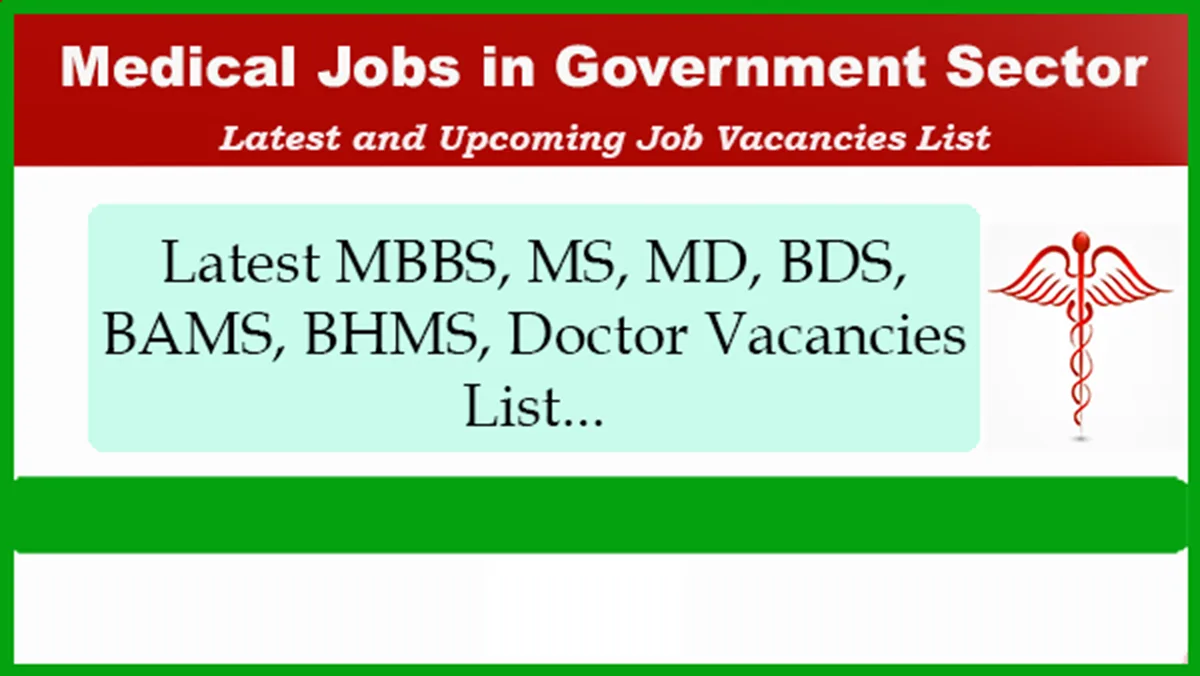Government medical positions encompass roles across Central and State Health Services, Defence Medical Services, and public sector undertakings with medical wings. Appointments are typically through combined medical services exams, state PSC recruitments, and direct hospital vacancies.

| post date | Title | Last date | More details |
|---|
Role, Eligibility, Age Limit, Salary & Promotion
| Role | Eligibility (Education) | Age Limit | Salary Details | Career Promotion |
|---|---|---|---|---|
| Junior Medical Officer (JMO) | MBBS degree from MCI-recognized college; Internship completion | 21–35 years | ₹56,100–₹1,77,500 (Level 10) | Senior Medical Officer → Principal Medical Officer |
| Medical Officer (MO) | MBBS degree; State PSC/CMS exam qualification | 23–40 years | ₹61,300–₹1,93,900 (Level 11) | Specialist → Superintendent → Director |
| Senior Medical Officer (SMO) | MBBS + 3 years’ experience in Govt service | 25–45 years | ₹69,400–₹2,07,200 (Level 12) | Deputy Director → Joint Director |
| Specialist (e.g., MD/MS) | Postgraduate degree in respective specialty | 25–50 years | ₹1,31,400–₹2,17,100 (Level 13) | Head of Department → Dean/Director |
| Principal Medical Officer (PMO) | MBBS + PG + 10 years’ experience | 30–55 years | ₹1,44,200–₹2,18,200 (Level 14) | Additional Secretary (Health) → Health Secretary |
Eligibility & Educational Requirements
MBBS Degree: Must be recognized by the National Medical Commission (formerly MCI).
Internship: Completion of a one-year rotatory internship.
Exams: Qualify Central Medical Services (CMS) or respective State Public Service Commission exams for government appointments.
Medical faculty roles as Assistant professor in medical colleges
check every state assistant professor vacancy notification in medical colleges. every year it announnce recruitment notifications in AIIMS colleges.
https://www.youtube.com/watch?v=BRwtDQsTaRQ
career after mbbs
MBBS opens a world of opportunities beyond just clinical practice. Whether you aim for specialization, research, public health, or administration, there’s a path tailored to your interests and goals. Below is an SEO-friendly guide to the most popular career options after MBBS.
1. Postgraduate Medical Specialization
Pursuing MD/MS/DNB deepens your expertise in a chosen field.
| Path | Qualification | Duration | Scope |
|---|---|---|---|
| MD (Doctor of Medicine) | MBBS + NEET-PG qualification | 3 years | Internal Medicine, Pediatrics, Dermatology, etc. |
| MS (Master of Surgery) | MBBS + NEET-PG qualification | 3 years | General Surgery, Orthopedics, Obstetrics & Gyne. |
| DNB (Diplomate of National Board) | MBBS + NEET-PG qualification | 3 years | Equivalent to MD/MS across accredited hospitals. |
2. Super-Specialty Courses
For advanced clinical excellence beyond MD/MS.
DM (Doctorate of Medicine): Cardiology, Neurology, etc. (3 years)
MCh (Master of Chirurgiae): Neurosurgery, Urology, etc. (3 years)
3. Academic & Teaching Roles
Combine clinical work with training the next generation.
Junior Resident / Senior Resident: Hands-on training in medical colleges.
Assistant Professor / Professor: Requires postgraduate degree and teaching experience.
Medical Educator: Curriculum design, e-learning modules, simulation labs.
4. Research & Public Health
Shape healthcare policies and innovations.
PhD in Medical Sciences: Basic sciences or clinical research (3–5 years).
MPH (Master of Public Health): Epidemiology, biostatistics, health policy (2 years).
Fellowships: WHO, Gates Foundation, ICMR projects.
5. Government & Administrative Services
Serve at the policy level and manage health programs.
Civil Services (IAS/IPS): Broader administrative roles after UPSC CSE.
Health Administration: MHA (Master of Hospital Administration) for hospital management.
Medical Officer Posts: UPSC Combined Medical Services, State PSCs, NHM.
6. Allied Health & Industry Roles
Leverage your medical background in diverse sectors.
Pharmaceutical & Medical Writing: Clinical research, regulatory affairs.
Healthcare Management Consulting: Process optimization, policy advising.
Healthcare IT / Healthtech: Digital health solutions, telemedicine platforms.
7. Entrepreneurship & Innovation
Build solutions around healthcare gaps.
Startups: Diagnostic services, med-tech devices, wellness apps.
Social Enterprises: Rural health camps, tele-clinics, NGO leadership.
8. Alternative & Complementary Medicine
Blend traditional and modern practices.
Ayurveda / Homeopathy / Naturopathy: Integrated medicine courses.
Certificate Programs: Yoga therapy, nutrition counseling.
Age Criteria
Age relaxations apply for reserved categories as per central/state government norms. Ensure you check the official notification for category-wise details.
Salary Structure
Government pay scales follow the 7th Pay Commission. Increments and allowances (DA, HRA, TA) are added to the basic pay, making MBBS Govt Doctor Jobs financially rewarding and competitive.
Career Growth & Promotion Path
Government medical services offer a well-defined hierarchy. Starting as a Junior Medical Officer, one can climb to senior supervisory roles, head departments, and even occupy policy-making positions. Regular promotions are based on experience, performance appraisals, and clearing departmental exams.
Frequently Asked Questions (FAQs)
What is the selection process for MBBS Govt Doctor Jobs?
Selection generally involves a written exam (CMS/PSC), document verification, and medical fitness tests.Is there an interview round?
Some State PSC recruitments include a personal interview or skill test after the written exam.Can private practice be pursued alongside government service?
No. Government regulations prohibit private practice to avoid conflicts of interest.Are there opportunities for further specialization?
Yes. Officers can pursue in-service postgraduate courses (MD/MS) through sponsored seats.What allowances are offered?
Besides basic pay, DA, HRA, TA, and special allowances (rural, hardship) are provided based on posting.